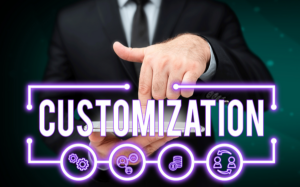in: Enterprise Resource Planning (ERP), Company News

Modern ERP systems like Acumatica and Sage can give your business an edge over your competition. But in order to maximize your ERP’s potential, you should customize the system to meet your unique business needs.
While any ERP will be functional right after installation, it will be generalized in order to work with any business. But your business is unique! You need customizations that address your company’s particular needs and goals. By customizing your ERP, you’ll expand the possibilities for your business and allow your ERP to best support you. When you customize your ERP based on in-depth knowledge of your requirements, the result will be improved efficiency, flexibility, and usability.
Consider Before You Customize
While customizations are essential for an ERP’s optimal performance, there are questions you’ll need to ask before implementing them. In the first place, what is the time and cost associated with this customization? Customizations range from simple to complex, and you want to have a solid understanding of what the customization you’re envisioning will require from your company and your ERP partner.
Simple customizations can be accomplished fairly easily by someone who has proven coding ability: they will need to write code and integrate that new code with the existing code within the ERP. But the more complex your customization becomes, the greater the chances of something going wrong and the harder it is to reverse any mistakes. For this reason, if you decide a more complex customization is right for you, you may want to partner with your support team or vendor in order to get expert help.
Four Types of Customizations
Here are four of the most common customizations that ERP customers implement. Each can save you time, money, and headaches!
- Custom Integrations
Your business probably uses other software solutions alongside your ERP in order to best serve your customers. For your company to run smoothly and efficiently, it’s essential to connect these systems to your ERP. You can connect anything from e-commerce software, smart devices, custom APIs, cloud services, and other third-party tools to your ERP.
- Workflow Automations
Another crucial ERP customization is automating your business’s unique workflows. Through custom workflows, you can create your own rules for items, accessibility, customer types, and more. You can easily create BOMs based on rules and formulas that you create. And most importantly, you can create a more secure system for your company and your clients.
- User Interface Customizations
Your ERP should work for you! By customizing your user interface, you can personalize nearly everything: field labels, data analytics, trends, business reports, and even screen layouts and color schemes. Your users need their best tools at their fingertips, and user interface customizations can provide this crucial usability improvement. You can also differentiate user access and views according to departments or roles within the company.
- Functionality Extensions
Lastly, when a new feature is added to your ERP, you may need to implement a functionality extension. Functionality extensions are necessary modifications to your system in order to accommodate new features or updates. While these customizations may not be as exciting as some of the other options, they are essential to maintain system efficiency and ease of use.
Ready to Customize Your ERP?
Are you ready to reap the benefits of a customized ERP? As a leading provider of advanced ERP software solutions, Mindover can help you with both simple and complex customizations in order to improve the productivity, efficiency, and usability of your ERP system. Contact us today to learn more.